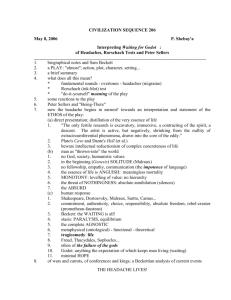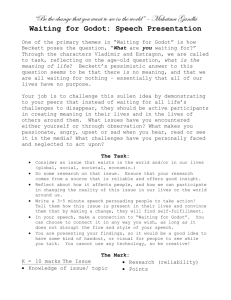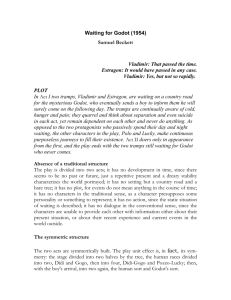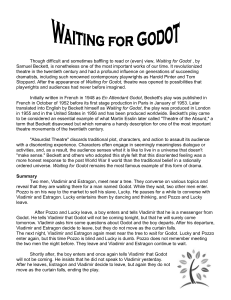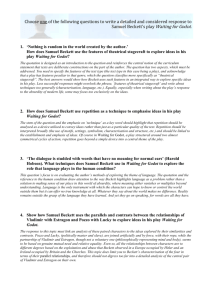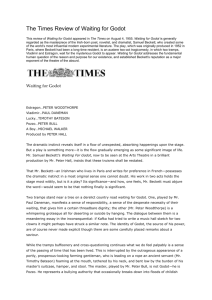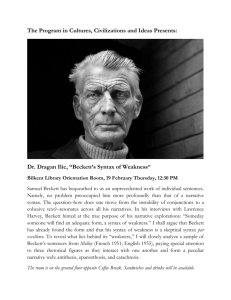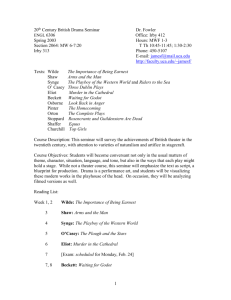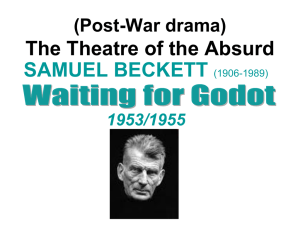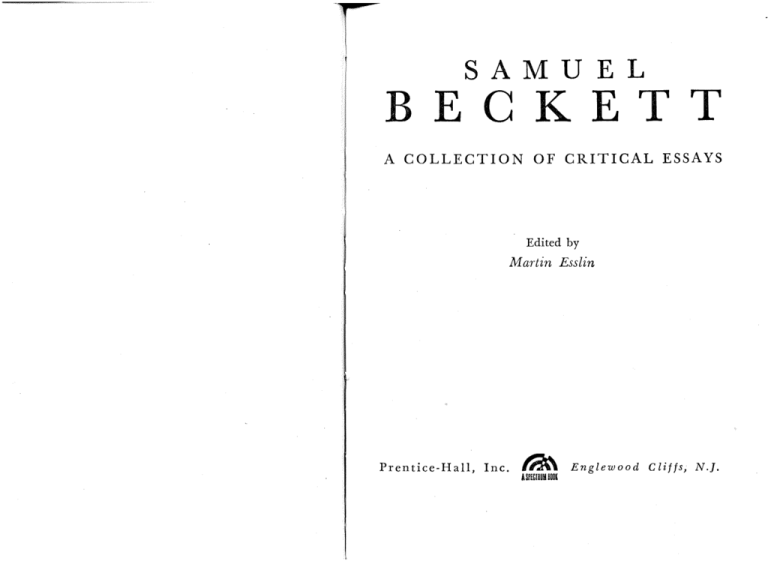
SAMUEL
BECKETT
A COLLECTION OF CRITICAL ESSAYS
Edited by
Martin Esslin
Prentice-Hall, Inc.
l'l1A\
ASfECIBUM BDDl
Englewood Cliffs, N.J.
LiBRARY
Ul'41VERSITY OF CALIFORNIA
SANTA BARBARA
Contents
Introduction, by Martin Esslin
1
Three Dialogues, by Samuel Beckett and Georges Duthuit
The Private Pain and the Whey of Words: A Survey of
Beckett's Verse, by john Fletcher
J
Samuel Beckett: Humor and the Void, by Maurice Nadeau
/The Beckett Hero, by A. j. Leventhal
23
33
37
J
The Cartesian Centaur, by Hugh Kenner
Watt, by jacqueline Hoefer
J Samuel Beckett and Universal Parody, by jean-jacques
Mayoux
77
JFailure of an Attempt at De-Mythologization: Samuel Beckett's
Novels, by Dieter Wellershoff
92
Samuel Beckett, or "Presence" in the Theatre, by Alain RobbeGrillet
108
Reflections on Samuel Beckett's Plays, by Eva Metman
Copyright
© 1965 by Prentice-Hall, Inc., Englewood Cliffs, New Jersey.
A SPEC-
All rights reserved. No part of this book may be repmduced in any
form, by mimeograph or any other means, without permission in writing from
the publishers. Library of Congress Catalog Card Number 65-23302. Printed in
the United States of America-C. Po7298, Co7299
TRUM BOOK.
~Being
without Time: On Beckett's Play Waiting for Godot,
by Gunther Anders
140
Beckett's Brinkmanship, by Ross Chambers
152
Philosophical Fragments in the Works of Samuel Beckett, by
Ruby Cohn
169
Being without Time: On Beckett's Play· Waiting for Godot
Being without Time:
On Beckett's Play Waiting for Godot
by Gunther Anders
1.
The play is a negative parable.
All commentators are agreed on this: that it is a parable. But _although the dispute about the interpretation of the parable rages With
the utmost intensity, not one of those who quarrel.about who ~r -~hat
Godot is, and who promptly (as though it we:e the ~~C o~ mhi!,Ism)
answer this question with "death" or "the meanmg of hfe or God, has
given the least thoug·ht to the mechanism by which all p~;~bles,. an~
hence Beckett's. parable too, work. This mechanism we call mverswn.
What is inversion?
When Aesop of Lafontaine wanted to say: men are like anim~ls:-<Iid
they show men as animals? No. Instead they reversed-and this IS the
peculiarly amusing alienation elie~t of all fab~es-the two elements ~f the
equation, its subject and its predicate; that Is: they stated that ammals
behave as men. A quarter of a century ago Brecht followed the same
principle, when, in the Threepenny Opera,_ he. wanted to s~ow that
bourgeois are thieves; he too turned t_he su_bJeC~ mto the predica_te ~nd
presented thieves behaving as bourgeois. ~t IS th:s process of subs~ltutwn
which one must have grasped before startmg to mterpret Beckett s fable.
For Beckett too uses it-in an extremely subtle way.
In order to present a fable about a kind of existence, which has lost
both form and principle and in which life no longer goes _forward, he
destroys both the form and the principle so far characteristic of fables:
now the destroyed fable, the fable which does not go forward, becomes
the adequate representation of stagnant life; his meaningless parable
about man stands for the parable of meaningless man. True: this fable
"Being without Time: On Beckett's Play Waiting for Godot" by Gunther Anders
[Original title: "Sein ohne Zeit. Zu Becketts Stiick E~ attendant G~dot"~· Fro~ Die
Antiquiertheit des Menschen. Ober die Seele im Zeztalter der zwezten m~ustnellen
Revolution (Munich: C. H. Beck, 1956). Originally published in Neue Schwezzer Rundschau (January 1954). Translated by Martin Esslin 'and revised by the author. Copyright © 1956 by C. H. Beck'sche Verlagbuchhandlung. Reprinted by permission of
the trar)slator and the publisher.
140
<:1
141
no longer corresponds to the formal ideal of the classical fable. But as it
is a fable about a kind of life that no longer has any point that could be
presented in the form of a fable, it is its weakness and its failure itself
which becomes its point; if it suffers from lack of cohesion this is so because lack of cohesion is its subject matter; if it renounces relating an
action, it does so because the action it relates is life without action; if it
defies convention by no longer offering a story, it does so because it describes man eliminated from, and deprived of, history. That the events.
and fragments of conversation which constitute the play arise without
motivation, or simply repeat themselves (in so insidious a manner that
those involved do not even notice the fact of repetition), needs to be·
denied: for this lack of motivation is motivated by the subject matter; and
this subject matter is a form of life without a motive principle and without motivation.
Although it is, so to say, a negative fable, it nevertheless remains a
fable. For despite the fact that no active maxims can be derived from it,
the play remains on the level of abstraction. While the novels of the last
one hundred and fifty years had contented themselves to narrate a way
of life that had lost its formal principle, this play represents formlessness
as such; and not only this-its subject matter-is an "abstraction"; als<>
the characters are "abstractions": the play's "heroes," Estragon and
Vladimir, are clearly men in general; yes, they are abstract in the most
cruel, literal sense of the word: they are abs-tracti, which means: pulled
away, set apart. And as they, having been pulled out of the world, no·
longer have anything to do with it, the world has, for them, become
empty; hence the world of the play too is an "abstraction": an empty
stage, empty but for one prop indispensable to the meaning of the fable:
the tree in its center, which defines the world as a permanent instrument
r suicide, or life as the non-committing of suicide.
.1
The two heroes thus are merely alive, but no longer living in a world. J
nd this concept is carried through with such merciless consequence that
other attempts at representing a form of life that has lost i•ts world-and
contemporary literature, philosophy, and art are by no means poor in
such representations-appear cosy in comparison. Doeblin's Franz Biberkop£,1 after all, still stood in the center of that bustle of worldly life that
no longer was of any concern to him; Kafka's surveyor K. still tried to get
into his castle, not to mention the forerunner of them all, Kleist's MichaeL
Kohlhaas, who still did battle with the world, even though he treated it
as if it were Kant's domain of morality. Somehow all these still partook
of the world: Biberkopf had too much of the world and hence no world of
his own; K. still hoped for a world that he might reach; and Kohlhaas
still knew the world-to him the world had become identical with the
perfidy against which he fought. None of them had yet quite arrived in a
j
1 The hero of the novel Berlin Alexanderplatz (1929) who loses contact with the city
around him when he becomes unemployed,
142
Gunther Anders
"non-world." Beckett's creatures have. In their ears even the ,thunder of
the world's bustle which had deafened Biberkopf has died away; they have
forgotten even to try to penetrate into the castle of the world; they have
renounced even the attempt to measure this world by the standards of
another. That this real loss of a world requires special means if it is to
be represented in literature or on the stage goes without saying. Where
a ~orld no longer exists, there can no longer be a possibility of a collision
wzth _the world, and therefore the very possibility of tragedy has been
(orfezted: 0~ to put it more precisely: the tragedy of this kind of exIstence hes m the fact that it does not even have a chance of tragedy,
that it must always, at the same time, in its totality be farce (not, as in the
tragedies of our forebears, merely shot through with farce): and that
therefore it can only be represented as farce, as ontological farce, not as
comedy. And that is what Beckett does.
We know from Don Quixote how closely abstraction and farce are connected. But Don Quixote had merely abstracted from the actual condition of his world; not from the world as such. Beckett's farce, therefore,
is ~ore "radical": for it is not by placing people in ·a world or situation
which they do not want to accept and with which they therefore clash
that he produces his farcical effects, but by placing them in a p1<!c~ __that is
no place at all. This turns them into clowns, for the metaphysical
comicality of downs does, after all, consist in their being unable to distinguish between being and non-being, by falling down non-existing
stairs, or by treating real stairs as though they did not exist. But in contrast to such clowns (like Chaplin) who, in order to create ceaseless
laughter have to keep themselves ceaselessly busy and who collide with
the world almost on principle, Beckett's heroes are indolent pr paralyzed
clowns. For them, it is not just this or that object but the world itself that
does not exist, hence they renounce altogether any attempt to concern
themselves with it. Thus the fabulae personae whom Beckett selects as
representative of today's mankind can only be clochards, creatures excluded from the scheme of the world whohave nothing to do any longer,
because they do not have anything to do with it.
2. The proposition: I remain,
therefore I am waiting for something.
Nothing to do any longer.-Ever since Doeblin, more than twenty years
ago, had described in Biberkopf a man sentenced to doing nothing and
t?erefore deprived of a world, "action" has become more and more questiOnable; not because the number of unemployed has increased-it has
_not-but because millions who are in fact still active, increasingly feel
that they are acted upon: that they are active without themselves deciding
on the objective of their action, without even being able to discern the
Being without Time: On Beckett's Play Waiting for Godot
143
nature of th9t objective; or because they are aware that their activity is
suicidal in its objective. In short: action has lost so much of its independence that it itself has become a form of passivity, and even where action
is deadly strenuous or actually deadly, it has assumed the character of
futile action or inaction. That Estragon and Vladimir, who do absolutely
n<>.thing, are representative of millions of people, is undeniable.
r/f"""'-But they are so fully representative only, because, in spite of their in. ·\fiction and the pointlessness of their existence, they still want to go on,
and thus do not belong to the tragic class of those who consider suicide.
They are as far removed from the noisy pathos of the desperado-heroes of
nineteenth-century literature as from the hysteria of Strindberg's characters. They are truer: just as untheatrical and just as inconsistent as
the average mass man actually is. For mass men, after all, don't give up
living even when their life becomes pointless; even the nihilists wish to
go on living, or at least they don't wish not to be alive. And it is not
despite the pointlessness of their life that the Estragons and Vladimirs
wish to go on living, but, on the contrary, just because their life has become pointless-by which I mean that, ruined by their habit of inaction
or of acting without their own initiative, they have lost their will power
to decide not to go on, their freedom to end it all. Or, ultimately, they
go on living merely because they happen to exist, and because existence
doesn't know of any other alternative but to exist.
It is with this kind of life, with man who continues existing because
he' happens to exist, that Beckett's play deals. But it deals with it in a
manner basically different from all previous literary treatments of despair.
The proposition which one might attribute to all classical desperado
figures (including Faust) might have been expressed as: "We have no more
to expect, therefore we shall not remain." Estragon and Vladimir, on the
other hand, use "inversions" of this formula: "We remain," they seem to
be saying, "therefore we must be waiting for something." And: "We are
waiting, therefore there must be something we are waiting for."
These mottoes sound more positive than those of their forbearers. But
they only sound more positive. For it cannot be said that the two tramps
are waiting for anything in particular. They even have to remind each
other of the very fact that they are waiting and for what they are waiting.
Thus, actually they are not waiting for anything. But exposed as they are
to the daily continuation of their existence they can't help concluding
that they must be waiting; and exposed to their continued waiting, they
can't help assuming that they are waiting for something. Just as we, seeing people at night waiting at a bus stop, are forced to assume that they
are waiting, and that what they are waiting for will not be long in coming. Thus, to ask who or what the expected Godot is, is meaningless.
Godot is nothing but the name for the fact that life which goes on pointlessly misinterprets itself as "waiting," as "waiting for something." The
positive attitude of the two tramps thus amounts to a double negation:
144
Gunther Anders
their inability to recognize the senselessness of their position. As a matter
of fact, this interpretation is confirmed by the author himself, since
Beckett has told us that he is not so much concerned with Godot, as,
with "Waiting."
Being without Time: On Beckett's Play Waiting for Godot
145
island and never having been married, continuously expect the return
of their wives. And in Beckett's eyes we are all like them.
4· Demonstrations of God's existence "ex absentia."
S· Beckett does not show nihilistic men, but the inability
of men to be nihilists.
'l
To characterize this mode of life in which man continues to wait merely
because he happens to be, French commentators have used Heidegger's
term "Geworfenheit" (the fact and state of having been "thrown•· into
the world). Quite wrongly. For while Heidegger, in using this term, designates the contingency of each individual's being just himself (and demands that each take possession of his contingent being in order to make
it the basis of his own "design") the two heroes of Beckett's play do
neither, like the millions whom they represent. They neither recognize
their own existence as contingent, nor think of- abolishing this contingency, of transforming it into something positive with which they can
identify themselves. Their existence is far less heroic than that meant by
Heidegger, far more trustful, far more "realistic." They would be as
little likely to deprive a chair of its function and attribute to it a mere
functionless reality, as to regard themselves in that light. For they are
"metaphysicists," that is to say incapable of doing without the concept of
meaning. Heidegger's term represents an express dethroning of the concept of "meaning of life." Vladimir and Estragon, on the other hand,
conclude from the fact of their existence that there must be something
for which they are waiting; they are champions of the doctrine that life
must have meaning even in a manifestly meaningless situation. To say
that they represent "nihilists" is, therefore, not only incorrect, but the exact reverse of what Beckett wants to show. As they do not lose hope, are
even incapable of losing hope, they are naive, incurably optimistic ideologists. What Beckett presents is not nihilism, but the inability of man to
be a nihilist even in a situation of utter hopelessness. Part of the compassionate sadness conveyed by the play springs not so much from the
hopeless situation as such as from the fact that the two heroes, through
their waiting, show that they are not able to cope with this situation,
hence that they are not nihilists. It is this defect which makes them so incredibly funny.
That nothing is funnier than totally unjustified total confidence, writers
of comedy have amply proved in more than two thousand years-for instance by their predilection for the character of the cuckold who, despite
all evidence to the contrary, remains constitutionally incapable of distrust. Vladimir and Estragon are his brothers: they resemble those "maris
imaginaires" of the French fairy tale who, despite their living on a desert
No. That "Godot'' exists and that he is going to come, nothing of all
this has been suggested by Beckett with one single word. Although the
name "Godot" undoubtedly conceals the English word "God," the play
does not deal with Him, but merely with the concept of God. No wonder
therefore that God's image is left vague: what God does, so we read in
the theological passages of the play, is unknown; from hearsay it appears
as though he does nothing at all; and the only information conveyed by
his daily messenger boy, brother to Kafka's Barnabas, is that, alas, Godot
will not be coming today, but certainly tomorrow-and thus Beckett
clearly indicates that it is precisely Godot's non-arrival which keeps them
waiting for him, and their faith in him, alive. "Let's go."-"We can't.""Why not?"-"We're waiting for Godot."-"Ah."
The similarity to Kafka is unmistakable; it is impossible not to be reminded of the "Message of the Dead King." But whether this is a case of
direct literary indebtedness does not matter, for both authors are d-es enfants du meme siecle, nourished by the same pre-literary source. Whether
it is Rilke, or Kafka, or Beckett-their religious experience springs, paradoxically, always from religious frustration, from the fact that they do
not experience God, and thus paradoxically from an experience they
share with unbelief. In Rilke this experience springs from the inaccessibility of God (the first Duino elegy); in Kafka from inaccessibility in a
search (The Castle); in Beckett from inaccessibility in the act of waiting.
For all of them the demonstrations of God's existence can be formulated
as: "He does not come, therefore He is." "Parousia does not occur, therefore He exists." Here the negativity we know from "negative theology"
seems to have affected the religious experience itself-thereby intensifying
it immensely: while in negative theology, it was merely the absence of
attributes that was being used to define God, here God's absence itself is
made into a proof of His being. That this is true of Rilke and Kafka is
undeniable; likewise that Heidegger's dictum which he borrows from
Hoelderlin-"for where danger is growing, rescue is growing, too"-belongs to the same type of "proof ex absentia." And now the same applies
to Beckett's characters. To his characters, though not to Beckett himself.
For he occupies a special position: although he puts the conclusion that
the non-arrival of Godot demonstrates his existence into the mouths of his
creatures, he not only doesn't share this conviction, but even derides it as
absurd. His play therefore is certainly not a religious play; at most it
deals with religion. "At most": for what he presents is ultimately only a
faith that believes in itself. And that is no faith.
Gunther Anders
5· Being without
Tim~
When we try to find out how such a life, despite its aimlessness, can
actually go on, we make a most stranP'e discovery. For although continuing such a life doesn't go on it be~omes a "life without time." By
this I mean that what we call "time" springs from mar1's ne~ds and ~ro~
his attempts to satisfy them, tl1at life is terp.poral only becaus~ ne:_~s .are
~tis-&ed:;-or goals have already been reacheQ, .or ODJecuv~s
.reached are sltll at one's disposal. Now we have seen t~at m Estr.agon s
and Vladimir's lives, pbjectives ;o !o~ge.:..!xist. For th1s reason m the
play time does not exist either, 1 1 e 1s treading water," so to speak; ~nd
it is for this reason, and quite legitimately, that events and conversatiOns
are going in circles (just like figures on a stage who r~present pas~ers-by
and who walk off on the left only to re-enter on the nght pretendmg to
be other people); before and after become like left and rig~t, they l?se
their time character; after a while this circular movement g1ves the 1mpression of being stationary, time appears to be standing still and becomes
(in analogy to Hegel's "bad infinity") a "bad eternity."
.
Beckett carries this concept through with such com~lete co~s1stency
that he presents (which is probably without precedence m the h1story of
drama) a second act which is but a slightly varied version of the first act,
thus offering to our startled eyes nothing new or startling. Accustomed as
we are to encounter new situations in the course of a play, we are deeply
surprised by this lack of surprise, by the fac~ that the s~enes repeat themselves; and we are filled with the horror wh1ch we feel m front of people
who suffer from amnesia. For with one exception, none of the characters
is aware of this repetition; and even when reminded of i.t, they remain
incapable of recognizing that their experiences or conver~atwns are merely
recapitulations of yesterday's events or talk. Yet presentmg the.chara~ti'!rs
as victims of amnesia is absolutely legitimate; for where there Is no time,
there can be no memory either. And yet time here is not ~uite as roc~li.ke
as so often in Kafka's works. For, as Beckett leaves a rud1ment of act1v1ty
-of what kind this rudiment is we shall see shortly-there still remains a
minimum of time. Although a "stream of time" doesn't exist any longer,
the "time material" is not petrified yet, it still can somehow be pushed
back or aside and thus be turned into something like a "past": instead
of a moving stream, time here has become something like a stagnant mu~h.
True, to make this mush move is possible only for seconds, at most mmutes; if the tool that keeps this time moving is wi.thdrawn .only f~r a. moment, everything flows together again and nothmg rema1~s to md1cate
that anything at all has happened. Fleetingly, however, ume has been
produced and enjoyed.
.
. .
.
The rudimentary activity which can temporanly set th1s ~1m~ mush m
motion, however, is no longer real "action"; for it has no obJeCtiVe except
'
L
)
Being without Time: On Beckett's Play Waiting for Godot
147
to make time move which, in "normal" active life, is not the aim o£
action but its consequence. Although this formula may sound paradoxical,
if time still survives here, it owes its survival exclusively to the fact that
the activity of "time killing" has not died out yet. And for this reason
"consequence" amounts to the mere "sequence of time" which the two
tramps try to produce; no other meaning of consequence is known to
them. When the two play "leaving," they remain; when they play "?elping" they hardly lift a finger. Even their impulses of goodness or indignation stop so suddenly that their sudden disappearance gives the effect of
a negative explosion. And yet the two resume their "activity" time and
again, because this kind of activity keeps time moving, pushes a few
inches of time behind them, and brings them a few inches closer to the
alleged Godot.
This goes so far-and at this point the play achieves truly heartrending
tones-that the two even propose to act out feelings and emotions, that
they actually embrace each other, because, after all, emotions, too, are
motions and as such might push back the mush of stagnant time. If again
and again Vladimir and Estragon wrack their brains what to do next, they
are doing so because "it helps to pass the time," or because whatever they
do, will, as long as they'are doing something, reduce the distance which
separates them from Godot. The best way to overcome the doldrums is
through the activation of their being together, through their ever renewed
taking advantage of the chance that it is at least as a pair that they have
to bear their senseless existence. If they did not cling to each other desperately, if they could not rely on the never ceasing to and fro of their
conversation, if they had not their quarrels, if they did not leave each
other or reunite-actions which, after all, cannot take place without taking up time-they would actually be lost. That Beckett presents us with
a pair is, thus, not only motivated by his technical insight that a play
about a Robinson Crusoe of Expectation would coagulate and become a
mere painting, but also by his wish to show that everyone is the other's
pastime; that company facilitates endurance of the pointlessness of existence, or at least conceals it; that, although not giving an absolute guarantee that time will pass, it helps now and then. And if the one asks:
"Where have I put my pipe?" and the other replies: "Charming evening," these monologue-like cues and responses resemble the thrusts of
two blind duellers who, each 'stabbing into the darkness on his own, talk
themselves into believing that they are actually fighting each other.
Of course, in "normal life," during the interludes of leisure time, "passing the time" occurs, too. Playing games is an illustration: by simulating
activity, we try to make that time pass which otherwise would threaten
to stagnate. One could object that we do this only in our leisure time,
that, after all, we separate "real life" from "play"; while, in the case of
Vladimir and Estragon, it is just the incessant attempt to make time pass
which is so characteristic, and which reflects the specific misery and ab-
Gunther Anders
surdity of their life. But is it really legitimate to make this distinction
between them and ourselves? Is there really a recognizable boundary line
between our "real life" and our "playing"?
I do not think so. The pitiful struggle they are waging to keep up the
semblance of action is probably so impressive only because it mirrors our
own fate, that of modern mass man. Since, through the mechanization of
labor, the worker is deprived of the chance to recognize what he is actually
doing, and of seeing the objectives of his work, his working too has become
something like a sham activity.' Real work and the most absurd pseudowork1 differ in no way, neither structurally nor psychologically. On the
other hand, by this kind of work, man has become so thoroughly unbalanced that he now feels the urge to restore his equilibrium during his
leisure time by engaging in substitute activities and hobbies, and by inventing pseudo-objectives with which he can identify himself and which
he actually wishes to reach: thus it is precisely during his leisure time and
while playing that he seems to be doing real work-for instance by resuming obsolete forms of production such as cultivating his balcony garden or
do-it-yourself carpentering, etc. And this is not even the extreme case. For
mass-man today has been deprived so completely of his initiative and of
his ability to shape his leisure time himself that he now depends upon
the ceaselessly running conveyor· belt of radio and television to make
time pass. The best proof, however, for the affinity which exists. today
between working time and leisure time is. the fact that there are already
situations in which the two occur simultaneously, for instance in millions
of homes and factories where the flow of work and the flow of the radio
transmission are becoming one single stream. I{ the silly seriousness with
which Estragon and Vladimir struggle to produce a semblance of activity
strikes us as so deadly serious and so fantastically symptomatic for our
time, it is only because today working time and leisure time, activity and
indolence, real life and playing, have become so inextricably intertwined.
True, in order to pass the time, any action, even any sham activity,
will do. But no matter which action-to mobilize an action is so difficult,
because to do something solely in order to make the time pass requires
precisely that kind of freedom which Estragon and Vladimir, paralyzed
by the passivity of their life, have already forfeited. Therefore, Beckett
is wholly realistic when he makes the two fail in their attempts to play
games and when he shows them unable to master their leisure time. They
are all the less able to do that because they do not possess yet, as we do,
recognized and stereotyped forms of leisure pastimes, neither sport nor
Mozart Sonatas, and are, therefore, forced to improvise and invent their
games on the spot, to take activities from the vast store of everyday actions
and transform them into play in order to pass the time. In those situations
1
For instance: in the period of maximum unemployment preceding Hitler, certain
workers were ordered to dig ditches and to fill them again just in order to keep themselves busy.
Being without Time: On Beckett's Play Waiting for Godot
149
in which we, the m0re fortunate ones, play football and, once we have
finished, can start all over again, Estragon plays the da capo game
"shoe off, shoe on"; and not in order to exhibit himself as a fool,
but to exhibit us as fools: in order to demonstrate through the device
of inversion that our playing of games (the pointlessness of which is already made invisible by its public recognition) has no more meaning
than his. The inverted meaning of the scene in which Estragon plays
"shoe off, shoe on" reads: "Our playing of games is a shoe off, shoe on,
too, a ghostly activity meant only to produce the false appearance of
activity." And, in the last analysis: "Our real shoe on, shoe off-that is:
our everyday existence-is nothing but a playing of games, downlike
without real consequences, springing solely from the vain hope that it
will make time pass." And: "We are their brothers-only that the two
clowns know that they are playing, while we do not." Thus it is not they
but we who are the actors in the farce. And this is the triumph of Beckett's
inversion.
6. Enter the Antipodes.
It is clear that the two must envy the fate of those fellow-men who do
not need to keep the "time mush" moving themselves, or who do this as
a matter of course1 because they don't know ·of any alternative. These
antipodes are Pozzo and Lucky.
·
Attempts to decipher who they are aH:d what they symbolize have kept
the commentators no less busy than the question of the identity of Godot.
But all these attempts went in the wrong direction, because the pair
itself has a deciphering function. What do I mean?
I mean that the two already had existed in the form of concepts, that
they already had played a role in speculative philosophy, and that Beckett
has now retranslated the two abstractions into concrete figures.
Since the early thirties when Hegel's dialectic and Marx's theory of the
class struggle began to interest the younger generation in France, the
famous image of the pair "master and servant" from Hegel's Phaenomenologie des Geistes so deeply engraved itself into the consciousness of
those intellectuals born around 1900 that it occupies today the place
which the image of Prometheus held in the nineteenth century: it has
become the image of man in general. Sartre is the chief witness of this
change. True, in the Orestes of his Les Mouches he still presented the
typical Promethean figure (as had Goethe, Shelley, Byron, and Ibsen);
but afterwards he replaced this figure by the Hegelian symbol. What is
decisive in this new symbol is its "pluralization" and its inherent "antagonism": that "Man" is now seen as a pair of men; that the individual
(who, as a metaphysical self-made man, had fought a Promethean struggle against the Gods) has now been replaced by men who fight each other
150
Being without Time: On Beckett's Play Waiting for Godot
Gunther Anders
for domination. It is they who are now regarded as reality; for "to be"
now means "to dominate" and to strugrrle for domination;. and they
alone are seen as the "motor of time": f;r time is history; and history,
in the eyes of dialectical philosophy, owes its movement exclusive:y to
antagonism (between man and man or class and class); so ~xclusi_vely,
that at the moment when these antagonisms came to an- end, history Itself
would cease, too.
Now this Hegelian symbol of the motor of history steps onto th~ stage
embodied by the figures Pozzo and Lucky, onto the stage on which, so
far, nothing had reigned but "being without time"-if it can be said of
such stagnation that it "reigns." It is quite und~rstandable th~t the
entrance of this new pair intrigues the spectator. Fnst for aesthetic reasons: the stagnation which, at the beginning, he had rejected a~. ?ardly
acceptable, but finally accepted as the "law of the Godot wo:ld, IS s_uddenly disturbed by the intrusion of characters who are. undemab~y active.
It is as though before our very eyes a still photo turned mto a movie.
.
But however shy Vladimir and Estragon may feel when first facmg
the new pair, there is one thing they cannot conceal: that they regard
them as enviable. It is evident that, in the eyes of those who are sentenced
to "being without time," the champions of time, even the most infernal
ones, must appear as privileged beings. Pozzo, the master, is enviaJ:>le because he has no need to "make time" by himself, or to advance by himself,
not to speak of waiting for Godot: for Lucky drags him forward anyway.
And Lucky, the servant, is enviable because he not only can ~arch on,
but actually must do so, for Pozzo is behind him and sees to It that he
does. And even though they pass the two timeless tramps by without
knowing that they have already done so the day bef~re-a_s "bl~nd .history" as it were, which has not yet become aware of Its bemg historythey nevertheless, whether dragged or pushed, are already in motion a~d
therefore, in Estragon's and Vladimir's eyes, fortunate creatures. It IS,
therefore, quite understandable that they suspect Pozzo (although he has
never heard Godot's name and even mispronounces it as a matter of
principle) of being Godot himself; for behind Pozzo's whip, they feel,
their waiting might find an end. Nor is it a coincidence that Lucky, the
beast of burden, is called by that name. For although he has to . bear
everything and spends his life carrying sacks filled with sand, he _Is
tally freed from all burdens of initiative and if they could stand m his
place they would no longer be compelled to wait about at one and the
same place, they could move on, because they would be forced to move on,
their hell would have lost its sting, and once in a while even a bone
might be thrown to them.
Any attempt to find in this image of man and his world posltlve or
consoling features would, after all we have said, be in vain. And yet,
in one respect Beckett's play differs from all those nihilistic documents
which mirror our age: in its tone. The tone of those documents usually
t<:
151
is of that seriousness that (because it does not yet know the human warmth
of humor) could be called beastly; or it is (since no longer concerned
with man) cynical, thus inhuman, too. The clown however-and that
this is a clownish play we have shown-is neither beastly serious nor
cynical; but filled with a sadness which, since it reflects the sadness of all
human fate, creates solidarity amongst meri and, by doing so, may make
this fate a little less unbearable. It was no coincidence that the character
who earned more ·gratitude in our century than any other was the pitiful
figure of the early Chaplin. Farce seems to have become the last asylum
for compassion, the complicity of the sad our last comfort. And although
the mere tone of humaneness which springs from this barren soil of meaninglessness may only be a tiny comfort; and although the voice which
comforts us does not know why it is comforting and who the Godot is
for whom it makes us hope-it shows that warmth means more than
meaning; and that it is not the metaphysician who has the last word.

